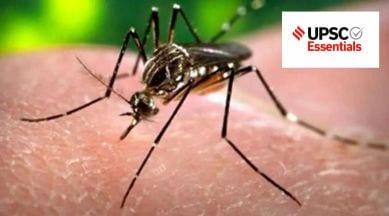Manas Srivastava leads the UPSC Essentials section of The Indian Express (digital). He majorly writes on UPSC, other competitive exams and education-related projects. In the past, Manas has represented India at the G-20 Youth Summit in Mexico. He is a former member of the Youth Council, GOI. A two-time topper/gold medallist in History (both in graduation and post-graduation) from Delhi University, he has mentored and taught UPSC aspirants for more than five years. His diverse role in The Indian Express consists of writing, editing, anchoring/ hosting, interviewing experts, and curating and simplifying news for the benefit of students. He hosts the YouTube talk show called ‘Art and Culture with Devdutt Pattanaik’ and a LIVE series on Instagram and YouTube called ‘LIVE with Manas’.His talks on ‘How to read a newspaper’ focus on newspaper reading as an essential habit for students. His articles and videos aim at finding solutions to the general queries of students and hence he believes in being students' editor, preparing them not just for any exam but helping them to become informed citizens. This is where he makes his teaching profession meet journalism. He is also the editor of UPSC Essentials' monthly magazine for the aspirants. He is a recipient of the Dip Chand Memorial Award, the Lala Ram Mohan Prize and Prof. Papiya Ghosh Memorial Prize for academic excellence. He was also awarded the University’s Post-Graduate Scholarship for pursuing M.A. in History where he chose to specialise in Ancient India due to his keen interest in Archaeology. He has also successfully completed a Certificate course on Women’s Studies by the Women’s Studies Development Centre, DU. As a part of N.S.S in the past, Manas has worked with national and international organisations and has shown keen interest and active participation in Social Service. He has led and been a part of projects involving areas such as gender sensitisation, persons with disability, helping slum dwellers, environment, adopting our heritage programme. He has also presented a case study on ‘Psychological stress among students’ at ICSQCC- Sri Lanka. As a compere for seminars and other events he likes to keep his orating hobby alive. His interests also lie in International Relations, Governance, Social issues, Essays and poetry. ... Read More
UPSC Essentials: One word a day- West Nile Virus
What is West Nile Virus? Diseases in news become very relevant topics for UPSC-CSE. Aspirants must take a note of them.

Take a look at the essential concepts, terms, and phenomena from the static and current parts of the UPSC-CSE.
Word: West Nile Virus
monthly limit of free stories.
with an Express account.
Subject: Science (health)
Why is West Nile Virus in news?
– Kerala health department is on alert after the death of a 47-year-old from Thrissur due to the West Nile Virus.
– Earlier in 2019, a six-year-old boy in Malappuram district had died of the same infection.
-The virus was first reported in the Alappuzha district of the state in 2006 and then in Ernakulam in 2011.
What is the West Nile Virus?
– The West Nile Virus is a mosquito-borne, single-stranded RNA virus.
– According to the WHO, it is “a member of the flavivirus genus and belongs to the Japanese Encephalitis antigenic complex of the family Flaviviridae”.
– It is a flavivirus related to the viruses that cause St. Louis encephalitis, Japanese encephalitis, and yellow fever.
How does the West Nile Virus (WNV) spread?
– Culex species of mosquitoes act as the principal vectors for transmission. It is transmitted by infected mosquitoes between and among humans and animals, including birds, which are the reservoir host of the virus.
– According to WHO Mosquitoes become infected when they feed on infected birds, which circulate the virus in their blood for a few days. The virus eventually gets into the mosquito’s salivary glands. During later blood meals (when mosquitoes bite), the virus may be injected into humans and animals, where it can multiply and possibly cause illness.
– WNV can also spread through blood transfusion, from an infected mother to her child, or through exposure to the virus in laboratories.
How can WNV not spread?
– It is not known to spread by contact with infected humans or animals.
-According to the US Centre for Disease Control and Prevention (CDC), it does not spread “through eating infected animals, including birds. Always follow instructions for fully cooking meat”.
What is the incubation period of WNV?
– The incubation period for WNV disease is typically 2 to 6 days, but can range from 2 to 14 days, and can be several weeks in immunocompromised people.
What are the symptoms of WNV?
– The disease is asymptomatic in 80% of the infected people. The rest develop what is called the West Nile fever or severe West Nile disease.
– In these 20% cases, the symptoms include fever, headache, fatigue, body aches, nausea, rash, and swollen glands.
How dangerous can be WNV?
– Severe infection can lead to neuro-invasive diseases such as West Nile encephalitis or meningitis or West Nile poliomyelitis or acute flaccid paralysis.
-WNV-associated Guillain-Barré syndrome and radiculopathy have also been reported.
– It usually turns fatal in persons with co-morbidities and immuno-compromised persons (such as transplant patients).
Points to ponder: What is the treatment for West Nile Virus? Where do we find the cases in India?